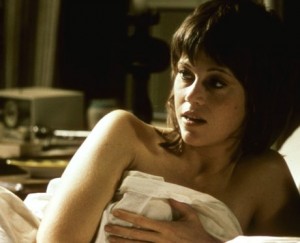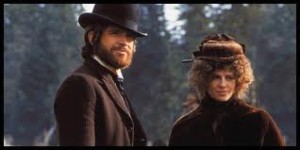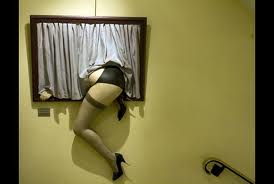WHEN SINEAD O’CONNOR recently likened Miley Cyrus to a prostitute, in an open letter, I thought, yes, yes, I can definitely see her point. But I could only stay interested for so long. These prostitutes, they come and go. By the time Amanda Palmer chimed in, in an open letter that seemed more concerned with boosting her own career, I was tired of the subject. Then I’m pretty sure Sufjan Stevens piped up, or was it Henry Kissinger? I started losing track. But the whole thing did get me thinking about prostitutes. As in: Who are my favorite prostitutes, anyway?
Certain ones stick in the mind. Holly Golightly, Truman Capote’s creation in Breakfast at Tiffany’s, was said by the author to be “not precisely a call girl” but rather “an authentic American geisha.” Tralala in Hubert Selby’s Last Exit to Brooklyn is memorably desperate and wrecked. They both of course eventually made it to the movies. Prostitutes in movies—there’s the gold mine. Gosh, there are so many to choose from. The idiotic sham of Julia Roberts in Pretty Woman unfortunately springs to mind. Fellini’s Nights of Cabiria is a beauty, worth watching just for Giulietta Masina’s shining moon of a face. Bunuel’s Belle de Jour is excellent for the rogue maneuvers of Catherine Deneuve’s bourgeois Séverine. But in Hollywood, prostitutes are rarely at the center of the story. Usually movie hookers are generic-looking women with gym-rat bodies hanging out in the backroom of a club somewhere that could be Vegas or L.A. or New York or Moscow, sitting on the laps of a bunch of guys who look like they just unloaded a lot of really crappy subprime mortgages. The whole scene is unctuous and uninteresting, even if those guys are everywhere in real life.
I want to know what a hooker thinks and feels after a long day at the office. The 1974 Alan Pakula movie Klute offered that in the character of Bree Daniels, played by Jane Fonda. Bree is connected to a murder and Missing Persons case, and John Klute (Donald Sutherland) has been sent to question her, eventually becoming her bodyguard as she becomes more and more a target. Klute is inscrutable, and Sutherland plays him with a perfectly unreachable look in his glacial blue eyes. Bree can’t mess with him the way she normally does with men. He simply doesn’t react. As Bree, Fonda is tough, jangly, “a nervous broad,” as she calls herself. In scenes with her shrink we learn what she thinks about her line of work. “When you’re a call girl, you control it,” she says. “I know I’m good….And for an hour I’m the best actress in the world. You don’t have to care about anything. You just lead [men] by the ring in their nose in the direction they think they want to go.”
Klute starts being nice to her, and she starts to fall for him. And this is what I like about the situation with Bree: She runs up against something in herself and has to decide whether to let herself change or not. (In a movie with some corny moments, this is done subtly. Fonda is worlds better than Julia Roberts at playing a whore.) If Bree comes out of her contrived and whore-y little comfort zone, what will she find? She feels angry when Klute makes her feel good. What do you want to do when you feel that way, the shrink asks her. “Manipulate him,” she says. “It’s easy to manipulate men, right?”
Well, it certainly can be, and most straight women enjoy doing that to men from time to time. But if it’s all a girl ever does, then she misses out on a lot of other fun stuff. Then she’s all Miley all the time, and the open letters never stop.
Another seventies indie auteur movie prostitute I love: Julie Christie in Robert Altman’s McCabe and Mrs. Miller. A whore/madam who goes into business with McCabe (Warren Beatty) in a brutal fledgling western town called Presbyterian Church, Christie’s character is crude, obsessive, short-tempered, and she badly needs her opium at the end of the day. She and McCabe spar and deflect, and when McCabe sometimes comes to her in the evening she expects five dollars in the till. McCabe grumbles to himself, as though talking to her, “Just one time you could be sweet without no money around. Just one time, let me run the show.” And then there’s a scene late in the movie where money is not exchanged. McCabe sits on the edge of her bed and it’s become clear he’s a marked and hunted man, wanted by the mining-company men, helpless in the face of greed and industry. Mrs. Miller gives him comfort. She invites him into her bed and the boundaries of artifice and money dissolve. It’s so beautifully done, and Christie is so magical in her transformation that any other “hooker with a heart of gold” like Julia Roberts or other purveyors of the Hollywood cliché look like cartoons in comparison.
Standing opposite the prostitute there is always the john, who, granted, is not necessarily looking for a heart of gold. My favorite john in recent memory is a character from a 1994 novel called Blue Mondays by Dutch writer Arnon Grunberg. This particular john is a far cry from the power elite: the investment-banking scumbags we usually see, the equivalent of the pimps and johns of the music industry that O’Connor brought up. Grunberg named the main character after himself and published the book, his first, when he was only twenty-three. His protagonist Arnon lives in Amsterdam and is still under the thumb of his oppressively annoying parents. He works crap jobs and drifts from call girl to call girl. He never asks for the same one twice. Long scenes play out in which he tries to talk to the women, tries to perform well and tries to get kissed. He’s just a lonely guy with bad skin trying to meet a girl.
I remember locking eyes with a prostitute once, a real one. This was in a shabby hotel in the south of France, the sort of fetid, dank place where your wet bathing suit never dries. It was cheap and I was a college girl and I had a knack for choosing the wrong places to stay. There was commotion during the night. I opened the door of my room to see what was going on out in the hall. There was an agitated German shepherd wandering around, a couple of shifty-looking guys, and a woman who was clearly working the place. She wasn’t young and she wasn’t old but was somewhere in that vast gray expanse in between. She looked up at me, a blank and neutral sidelong glance, and I remember thinking she looked exhausted—tired and manipulated (not the manipulator), almost beyond repair. And she did not look like Jane Fonda or Julie Christie or Catherine Deneuve or Miley Cyrus. She looked like a woman who needed to find a better line of work, and soon.






Klute’s good. My favorite prostitute is Elisabeth Shue in Leaving Las Vegas.
Gloria, yes, that character occurred to me too. Thanks for reading!
My favorite prostitute is Belle Watling from Gone With The Wind. I used to see real prostitutes all the time in NYC on 6th Avenue, and then in my neighborhood in Washington Heights. These were old school walking’ the streets prostitutes. They wore high heels and fur coats. I don’t think they have them anymore on 6th Avenue. This was 1990. I also saw one on St Marks Place when I lived in the East Village. She was wearing shorts and a halter top. They all had a hard hard look about them. And they looked pretty unhealthy. I just thought, ‘yikes, what a world’.
What a world, indeedy…. And wow, I had forgotten all about Belle Watling.
Cool piece. My vote goes to Liz Taylor in Butterfield 8.
Thanks for reading, Michael!
Consider Rita Moreno’s underrated performance with Jack Nicholson in a late scene in Carnal Knowledge. Nothing glamorous or cliched; just two desperate, middle-aged people (not even characters, their performances are that subtle) trying to get what they want from each other without giving anything of themselves.
Yes, that’s a good one, and your description of it is great. Thanks for reading.
Consider Rita Moreno’s brief role in a scene with Jack Nicholson late in Carnal Knowledge. Nothing glamorous or cliched; just two desperate, middle-aged people – not even characters, the performances are that subtle – trying to get something from the other without giving anything of themselves.
Jan, I just read your story about your mother and it hit hone. My mom just passed away also, (at 93). I remember your family well and always wondered how your lives’ evolved. I hope things are going well and please remember me to your brother and sister. – – bill.
Hi Bill, I have no idea if this response will get to you, but I’m just seeing your comment, more than two years later. Thank you so much for the comment, and I’m really sorry to hear about your mom. I’d love to hear more about your family. You can reach me at janetxsteen@gmail.com if you’d like. Best to you, Janet